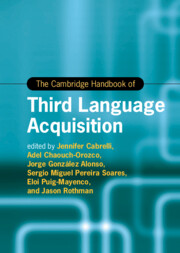Book contents
- The Cambridge Handbook of Third Language Acquisition
- Cambridge Handbooks in Language and Linguistics
- The Cambridge Handbook of Third Language Acquisition
- Copyright page
- Contents
- Figures
- Tables
- Contributors
- Introduction Multilingualism
- Part I Theoretical Approaches to L3/Ln
- Part II L3/Ln across Linguistic Domains
- Part III Becoming and Staying Multilingual at Different Ages
- 11 3L1 Acquisition
- 12 Multilingualism and Education
- 13 Language Attrition and L3/Ln
- 14 Heritage Speakers as L3 Acquirers
- 15 The Effects of Environment Change on Third Languages
- Part IV L3/Ln in Action
- Part V L3/Ln and Cognition
- Part VI Research Methods in L3/Ln
- Index
- References
15 - The Effects of Environment Change on Third Languages
The Case of Returnees
from Part III - Becoming and Staying Multilingual at Different Ages
Published online by Cambridge University Press: 13 July 2023
- The Cambridge Handbook of Third Language Acquisition
- Cambridge Handbooks in Language and Linguistics
- The Cambridge Handbook of Third Language Acquisition
- Copyright page
- Contents
- Figures
- Tables
- Contributors
- Introduction Multilingualism
- Part I Theoretical Approaches to L3/Ln
- Part II L3/Ln across Linguistic Domains
- Part III Becoming and Staying Multilingual at Different Ages
- 11 3L1 Acquisition
- 12 Multilingualism and Education
- 13 Language Attrition and L3/Ln
- 14 Heritage Speakers as L3 Acquirers
- 15 The Effects of Environment Change on Third Languages
- Part IV L3/Ln in Action
- Part V L3/Ln and Cognition
- Part VI Research Methods in L3/Ln
- Index
- References
Summary
This chapter discusses the development of the language competence of returnee bilingual speakers, (i.e., heritage speakers who return to their (parents’) country of origin and, as a consequence of the return, are affected by changes of their language dominance). We discuss three scenarios in which an environmental shift may affect the status of a L3: (1) L3 attrition, when the L3 acquired in a foreign setting undergoes attrition due to reduction in input after returning to the homeland; (2) theoretical discussions of whether the relearning of an attrited L2 can be considered L3 acquisition; (3) the source of crosslinguistic influence on the L3 and how studying the returnee population can open an exciting opportunity to tease apart internal and external factors that are otherwise confounded in the traditional bilingual population. We combine the interpretation of the limited existing literature on language development in returnees with theoretical considerations, and propose research hypotheses to be tested in future research.
- Type
- Chapter
- Information
- The Cambridge Handbook of Third Language Acquisition , pp. 380 - 400Publisher: Cambridge University PressPrint publication year: 2023

